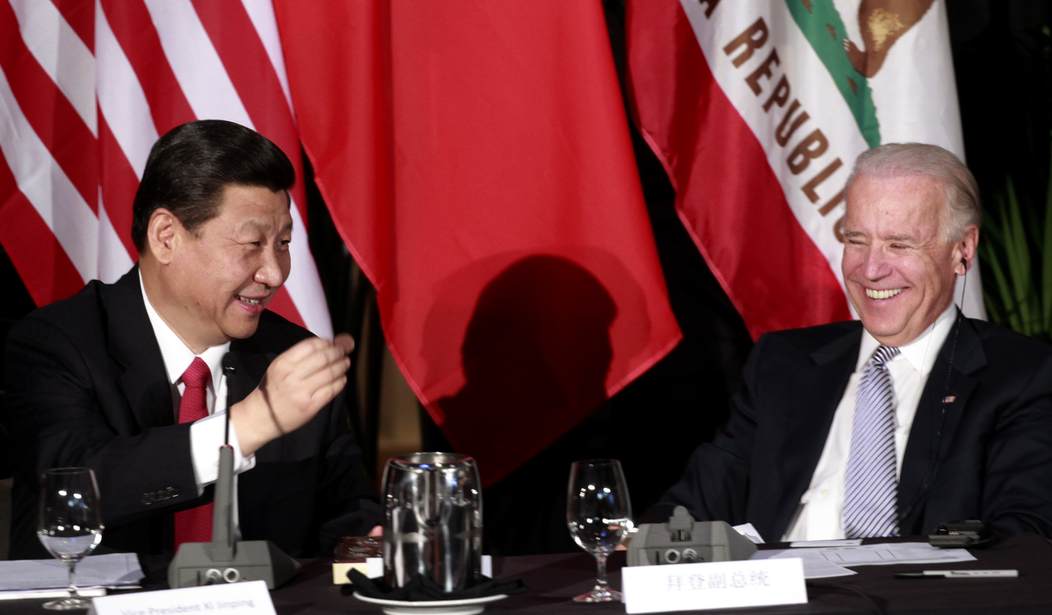The world is growing nervous these days as we watch China’s increasingly harsh rhetoric toward Taiwan begin to translate into increasingly provocative military displays. At the same time, the Chinese Communist Party has been purchasing its way into increasing its sphere of influence in places like Afghanistan, Africa, and South America, most particularly for the socialist regime in Venezuela. They’ve made improvements to their naval power and have developed hypersonic missiles rivaling anything America or the Russians have. And they’re building their own space station, reportedly vastly larger than the ISS, and partnering with Russia to do so. All of this has led Jim Geraghty to ask a disturbing question in today’s Morning Jolt. Is China already locked in to dominate the future, leaving America “sliding toward geopolitical defeat?
Through most of 2020, Joe Biden insisted that he was the tough one on China and that the Trump administration only offered “a colossal gap between tough talk and weak action.” Never mind that back in May 2019, Biden declared:
“China is going to eat our lunch? Come on, man. They can’t even figure out how to deal with the fact that they have this great division between the China Sea and the mountains in the east, I mean in the west. They can’t figure out how they are going to deal with the corruption that exists within the system. I mean, you know, they’re not bad folks, folks. But guess what, they’re not competition for us.” [Emphasis added.]
Ten months into the Biden administration, we’re still looking for that tough action.
Looking around the world today, Joe Biden’s 2019 declaration that China is “not competition for us” is aging just about as well as that time Barack Obama, speaking about Russia, told Mitt Romney that the 1980s called and they want their foreign policy back. (A comment the Washington Post would later praise as a prescient “zinger.”) But that sort of nostalgia doesn’t do much to address the pressing question at hand. Is China truly winning the battle to be the geopolitical ruler of the world?
Jim points out a number of areas where China indeed appears to be flexing its muscle and not seeming the least bit concerned about how we feel about it or how we respond. They also aren’t seeing Joe Biden giving them much reason to worry. A few applicable examples follow.
- Where is Biden’s tough action on the investigation into the origins of COVID while China continues to thumb their noses at us?
- How, at this stage, could Commerce secretary Gina Raimondo say “Robust commercial engagement will help to mitigate any potential tensions” with China?”
- Where is Biden’s outrage (and action) over China’s genocide of the Uyghurs?
- Why aren’t we even threatening to boycott the Winter Olympics in Beijing?
Read the rest of Jim’s list because it covers a lot more policy points and recent diplomatic interactions. And then ask yourself one question. If this was a schoolyard and you had to decide which classmate was the bully and which was about to have their lunch money taken, who would you bet on to be the one left crying and running to the teacher?
Fortunately, not all of the news is entirely dismal. It’s obvious that China’s power and influence have grown steadily over the past few decades (at least) and we have repeatedly underestimated their potential and misunderstood their core philosophies. Administrations from both parties have repeatedly insisted that if we just engaged in enough global commerce with China they would eventually embrace capitalism and work with the rest of us. Instead, they seized control of the global supply chains and stole whatever technology they could get their hands on while remaining the same pack of cruel socialist abusers they have always been.
That doesn’t make them the planet’s dominant superpower, however. Or at least not yet. But they have built up an alarming lead in some areas.
The first thing we think about in terms of defining a “superpower” is military might, though we may need to rethink that priority in the 21st century. China’s military has grown, but I’ve yet to see a respected analyst – such as Janes Defence – who believes they’ve surpassed either the United States or Russia yet. Neither their new aircraft carriers nor their air force is a match for America’s or Russia’s at this point, though they are growing by the year. Aside from a mutually self-destructive nuclear exchange, China couldn’t mount a land invasion and take over any nation very far outside their immediate neighborhood (see: Taiwan) if multiple countries wanted to stand against them.
Far more worrisome are their recent advances in technology. Granted, they stole most of it from other countries originally, but they’ve worked hard to improve and control many critical components of the global technology sector. We almost let them waltz away with control of the entire, global 5G network. There have long been concerns that their control of the global computer chip market has allowed them to leave their own digital spies and back doors in systems that everyone else relies on for survival. And the advances we suspect they’ve made in their ability to take out satellites, either using hunter-killer satellites of their own or ground-based weapons, leaves everyone vulnerable. If you can destroy the west’s satellites while keeping your own, you gain a massive advantage.
And finally, there is the aforementioned control of the global supply chain. Just look around and see how big of an impact a global shortage of truck drivers is fouling things up. China can shut off the supply lines entirely for a wide array of critical products running the gamut from high tech to toilet paper. The rest of the world let this happen, much to our own embarrassment. But it’s probably not to late to begin turning this pattern around. Or at least I certainly hope not.








Join the conversation as a VIP Member